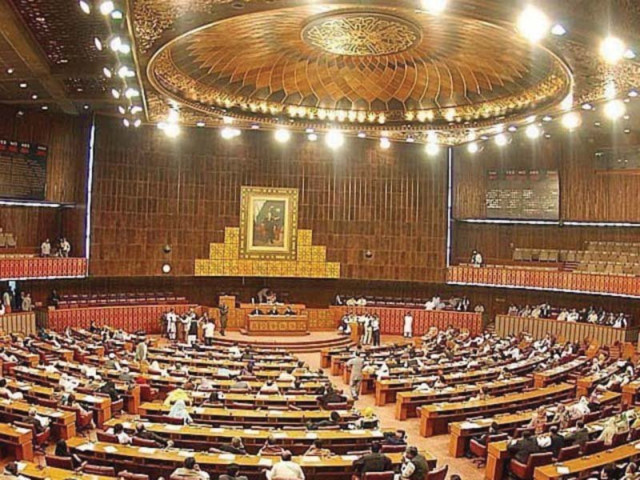Parliamentary scrutiny cracks open amnesty scheme
Standing committee fears anyone can exploit the scheme to legalise the assets

The NA committee deferred approval of the Tax Amnesty Bill 2016 for a day. PHOTO: FILE
The first parliamentary scrutiny has exposed vulnerabilities of the proposed tax amnesty scheme for traders, as the government is targeting to bring 2.3 million traders in the net by solely relying on database maintained by electricity distribution companies.
The absence of comprehensive database of the traders may be exploited by other sectors and individuals who can claim to be traders and get their money whitened by paying a nominal tax of 1%, claimed members of the Senate Standing Committee on Finance and Revenue on Monday.
Amnesty for tax evaders

The government has proposed the tax amnesty scheme for traders, offering to legalise their working capital up to Rs50 million with payment of a nominal 1% tax.
Chaired by PPP Senator Saleem Mandviwalla, the Senate standing committee met to debate the Income Tax Amendment Bill 2016. It found serious flaws in the Federal Board of Revenue (FBR) working.
NA standoff
In a related development, despite having majority, the government on Monday could not get the amnesty scheme cleared from the National Assembly Standing Committee on Finance.
The NA committee deferred approval of the Tax Amnesty Bill 2016 for a day after PPP MNA Dr Nafisa Shah and MQM MNA Rasheed Godil sought more clarifications.
PTI divided as PPP joins the chorus against tax amnesty scheme
Finance Minister Ishaq Dar also made backdoor efforts to convince the PPP and PTI to withdraw their opposition to the amnesty scheme.
During cross-questioning in the Senate committee meeting, the FBR admitted that its enforcement was weak and could so far bring only 61,527 traders in the tax net. There were only 51 traders who declared their annual income above Rs50 million.
Even in the future, the FBR was not sure if it could capture all the traders who are currently outside the net despite offering the amnesty scheme.
The government has based the Voluntary Tax Compliance Scheme on commercial electricity connections, which are around 2.9 million and their data is with power distribution companies, said Nisar Muhammad Khan, Chairman of the FBR.
He said out of 2.9 million, roughly 625,000 businessmen were in the tax net and the government was targeting the remaining 2.3 million people through the scheme.
Out of 625,000, the number of traders who are currently filing income tax returns are only 61,527, said Rehmatullah Wazir, Member Income Tax Policy of the FBR. He said 92% of them or 56,593 declared their income in the range of Rs0.4 to Rs1 million in 2014.
PM unveils voluntary tax filing scheme
About 3,150 traders showed their income in the range of Rs1 million to Rs2.5 million, about 1,075 traders in the range of Rs2.5 million to Rs5 million, about 3,493 in the range of Rs5 million to Rs10 million and 315 traders declared their income up to Rs50 million.
Wazir said there were only 51 traders in the country who showed their income above Rs50 million.
“The scheme appears a non-starter and I will be happy if the FBR could manage to bring only 20,000 traders in the tax net,” said Saleem Mandviwalla.
The FBR chairman, in response to the criticism, reminded the assembly that those who opt not to avail the scheme will have to pay 0.6% withholding tax on every banking transaction valuing over Rs50,000. If a trader files returns in 2015 but fails to file in subsequent years, he will be disqualified from the scheme and will have to pay taxes as general taxpayers do, said Dr Iqbal, Member Strategic Planning, Reforms and Statistics of the FBR.
Senator Saud Majid of the PML-N said due to the absence of database, anyone could come and avail himself of the scheme by declaring himself as a trader.
The standing committee proposed to include an action-based timeline in the scheme aimed at tracking the progress of the FBR that is currently making tall claims of bringing in 2.3 million traders in the net.
Published in The Express Tribune, January 12th, 2016.
Like Business on Facebook, follow @TribuneBiz on Twitter to stay informed and join in the conversation.



















COMMENTS
Comments are moderated and generally will be posted if they are on-topic and not abusive.
For more information, please see our Comments FAQ